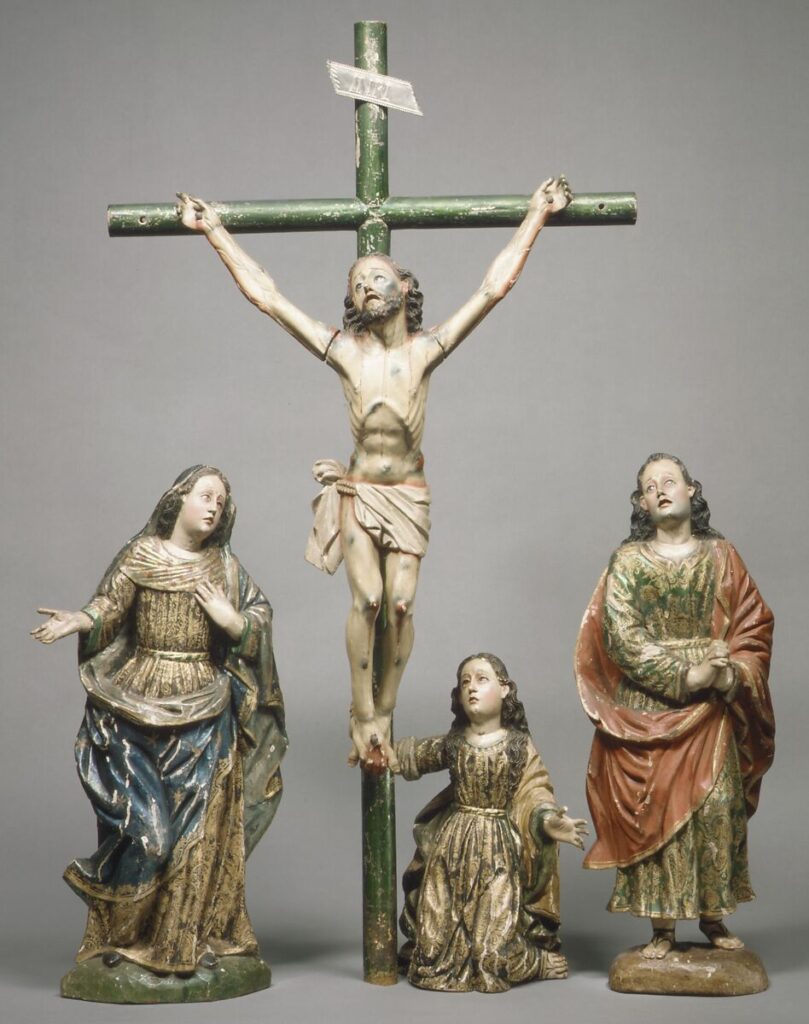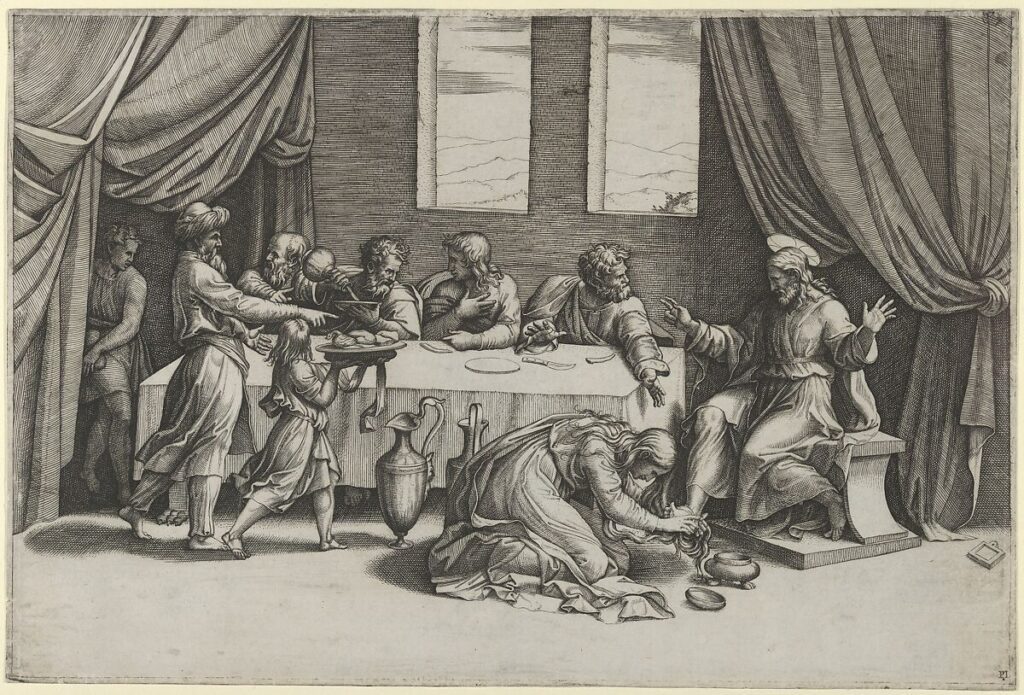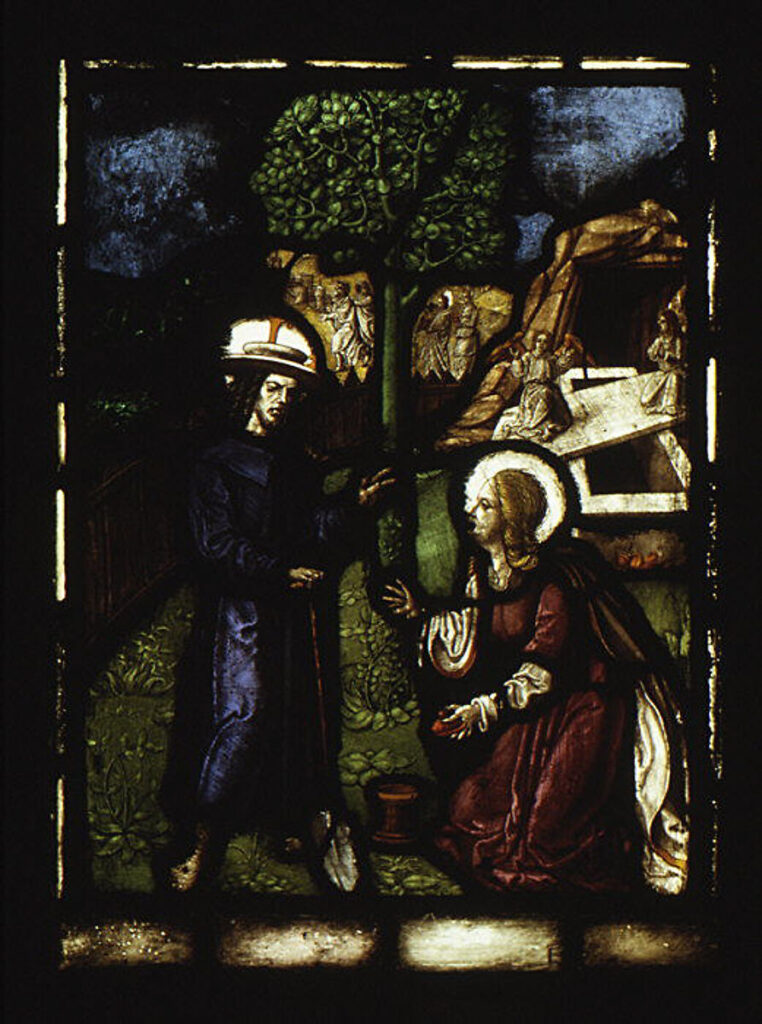Feast Day: July 22

How many Mary’s are there in the New Testament? The four Gospels each name three women disciples who witnessed Jesus’ crucifixion and/or his empty tomb: Mary Magdalene (meaning from the town of Magdala), Mary the mother of Jesus, Mary the mother of James, Mary the mother of James and Joseph, Mary the mother of James and Joses, Mary the wife of Clopas and sister of Jesus’ mother, the “other” Mary, plus Salome, Joanna, and the unnamed mother of the sons of Zebedee. If, like me, you count more than three names there, you begin to see the problem of Biblical interpretation. Since each Gospel only names three women, are some of these the same person but known by different nicknames? Or do we have ten separate women? Luke (24:10) refers to an anonymous group of women from Galilee in addition to the three he explicitly names, so one could justify a larger group.
In addition to that list of Mary’s from the Passion, there are three or four additional New Testament Mary’s. There’s a Mary the sister of Martha in Luke, who probably is the same as the Gospel of John’s Mary of Bethany, the sister of Martha and Lazarus. Is Mary of Bethany also one of the women at the cross? How about Mary the mother of the disciple John Mark in Acts 12:12? Is the later Mary who worked hard amongst the church in Rome (Rom 16:6) one of these original witnesses who traveled overseas to evangelize or is she a local Roman convert?
There are many unnamed women in the Gospels too. Mary of Bethany anoints Jesus with expensive perfume and dries his feet with her hair in a dramatic moment (John 12:1-8). Is she the unnamed women who does the same at the home of Simon the leper in Matthew 26:6-13 and Mark 14:3-9? And the sinful women who does the same at the home of Simon the Pharisee in Luke 7:36-50 even if that incident seems to happen earlier in Jesus’ ministry? Or was there a sudden epidemic of women gatecrashing Jesus’ dinner parties to dump perfume on him and swish hair around his feet?
The answers to these questions isn’t just academic; our knowledge of women like St. Mary Magdalene depends on it. Scholars have given different answers at different points in history and still disagree today. I would like to suggest that the most uncomfortable readings of Mary of Magdala are the most spiritually beneficial.

Mary, Apostle to the Apostles
By the Middle Ages, western Christians created a vibrant picture of the women around Jesus by accepting connections wherever they could. They speculated that Mary Magdalene and Mary of Bethany were the same person in light of the close relationship with Jesus enjoyed by both and due to Mary of Bethany’s surprising absence from the crucifixion-resurrection narratives in which Mary Magdalene plays a leading role. If the two Mary’s are the same person, then she had likely had her family home at Bethany outside Jerusalem and made her money in the bustling town of Magdala. Medieval scholars also believed all four incidents of a women anointing Jesus and washing his feet were different reports of the same instance, all done by Mary of Bethany-Magdala. Scripture doesn’t specify why she had a scandalous reputation as a public sinner, but one possible answer is prostitution. Perhaps, if she slept with the wrong man in the big city of Jerusalem, she also was the woman caught in adultery whom Jesus saved (Jn 8:1-11) and that’s how she became his disciple.
Most modern scholars (but definitely not all) take a more conservative approach, refusing to make connections between the different Mary’s or other unnamed women without hard evidence. If we take this approach, we know little of Mary Magdalene. Immediately after his account of the sinful woman washing Jesus’ feet, Luke lists her among Galilean women who followed Jesus and donated to his ministry (Lk 8:1-3). How they got their money or found the freedom to leave their homes is unknown. Luke also tells us that Jesus had driven seven demons out of her. Whether Jesus literally freed her from demonic possession or healed her of mental illness, physical illness, or addiction to sin is also unknown. Beyond that, all we know is that all four Gospels tell us Mary of Magdala stood at the foot of the cross on Good Friday and that God chose to reveal the good news of the resurrection to her first on Easter Sunday (perhaps along with other women).
In this modern view, we can say little about her but we can acknowledge her courage and faith. Most of Jesus’ disciplines fled when the Romans arrested him. Mary stayed. Presumably the Romans would have been less likely to arrest an unarmed woman as a revolutionary, but staying there with the hostile crowd and soldiers, watching them torture her beloved Jesus to death, took courage. To go out on Easter Sunday to the tomb to care for his body took courage too. To believe that God rose from the dead and to proclaim that to the male disciples, knowing their incredulity at female witnesses, took both courage and faith. That is why Mary of Magdala is called the “apostle to the apostles.” She is the one who first proclaimed the Resurrection to the church.
Rediscovering this aspect of Mary Magdalene has been important. Even if we know nothing else about her, recognizing the existence of another strong woman of faith in the Gospels can help inspire courage and faith among Catholic women. She also reminds Catholic men of the incredibly important ways women have spread the gospel through the centuries and continue to be partners in building the kingdom of God today. The fact that some men have found this aspect of Mary challenging is a sign of how necessary that reminder is.

Mary and the Horror of Prostitutes
Oddly, Mary evokes the most visceral and spiritually significant reactions today for the most speculative part of her story: being a prostitute. Google Mary Magdalene and you’ll find scores of breathless articles recoiling in horror at the notion. “Who Framed Mary Magdalene?” thunders the title of one article from U.S. Catholic. Other articles refer to deliberate slander, scandal, disparagement, and murky patriarchal conspiracies aimed at destroying Mary’s reputation. There’s a real anger there (despite the historical fact that Christians honored her precisely for overcoming a difficult past). It’s a shock that feels very modern. In some ways, it actually is two thousand years old. As Matthew’s Gospel says:
Jesus said to them, “Amen, I say to you, tax collectors and prostitutes are entering the kingdom of God before you.” … Jesus said to them, “Did you never read in the scriptures: ‘The stone that the builders rejected has become the cornerstone; by the Lord has this been done, and it is wonderful in our eyes.’ Therefore, I say to you, the kingdom of God will be taken away from you and given to a people that will produce its fruit.” When the chief priests and the Pharisees heard his parables, they knew that he was speaking about them.
Matthew 21:31, 42-45
On being told that God would give his kingdom to tax collectors and prostitutes instead of them, the Pharisees turned against Jesus and plotted to kill him. The Pharisees are better than many of us. They at least acknowledged that Jesus was speaking about them. We want to deny it.
We can handle tax collectors getting to heaven. If you love your country, you might grumble about paying taxes but you understand that it is a sacrifice that you need to make and from which you benefit (roads, military protection, schools, firefighting, etc.). If you know that in Jesus’ time tax collectors worked for what some Jews saw as a diabolical foreign power, then you might understand why his listeners might have had a visceral reaction towards those people similar to feelings in occupied France towards Nazi collaborators. However, if a bishop today decided to have lunch with IRS agents and tax professionals, it wouldn’t raise too many eyebrows. If a bishop made a habit of lunching with whores, many people would feel scandalized.
I suspect Mary of Madgala was not a prostitute, but I am very glad that this speculation about her life developed. Knowing an apostle (Matthew) was a tax collector doesn’t shock us out of our complacency anymore. Debating about Mary’s earlier career can. Are you willing to believe that Jesus’ love could make a prostitute a better person than you? Someone you should admire and imitate? For a Christian, the answer has to be yes. God’s grace is that powerful. People who our society marginalizes do have that hidden potential that God sees. Being Christian means learning to see others with eyes of love that penetrates beyond the scandal of violating the social hierarchy to see the despised as God’s beloved children. In the case of Mary Magdalene, her traditional association with prostitution has inspired Christians since the Middle Ages to reach out to prostitutes with love and to create organizations that have helped women who wanted to escape that life. Here, in practice, true Christian love that transcends social scandal made a difference in thousands of women’s lives.
Two Challenges
I invite you to sit with two challenges. First, imagine that Mary did have a life before Jesus that was contrary to God’s will, whether she chose it or society forced her into it. Do you, like the secular world, see that as something that diminishes her? Or can you, with the western Christian tradition, see her life as an even more love-filled celebration of God’s grace that transforms us sinners into more than we ever thought we could be?
Second, take a minute to reflect on society. What groups in it do you see as living intrinsically sinful lives? Murderers? Thieves? Drug addicts? The promiscuous? Socialists? Conservatives? Rural farmers? Politicians? Men of war? People of a particular ethnicity? God has raised saints from each and every one of these groups. They are there in heaven before you. Some found ways to turn their work to God’s glory, some repented of their old lives and found new paths with God’s grace. In each case, He saw the value of their souls. Let us each, with Mary Magdalene’s intercession, pray for the grace to see the potential in those people we’ve been conditioned to despise and then to love them as God does.
Finally, may we be inspired to acknowledge our own sins and so to proclaim God’s grace with greater courage and love.
If you have a response, thoughts, or questions, please comment at the bottom of the page. Consider subscribing below to get weekly email notifications about new reflections and other news.



1 Response
[…] contemporary Christians find the tradition of Saint Mary Magdalene being a former prostitute scandalous; that’s nothing compared to other saints like Moses the Black. Moses may have […]